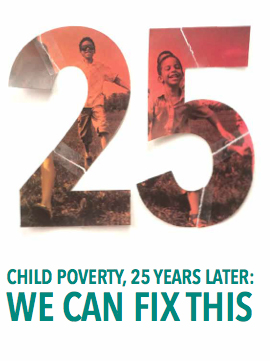 It has been 25 years since the House of Commons unanimously resolved to end child poverty in Canada and five years since Ontario announced its first Poverty Reduction Strategy (PRS). Yet, more than 1.3 million children in Canada and 550,000 in Ontario continue to live in poverty today. To highlight this gap, Ontario Campaign 2000 has released its Report Card on Child and Family Poverty, giving Ontario an overall failing grade.
It has been 25 years since the House of Commons unanimously resolved to end child poverty in Canada and five years since Ontario announced its first Poverty Reduction Strategy (PRS). Yet, more than 1.3 million children in Canada and 550,000 in Ontario continue to live in poverty today. To highlight this gap, Ontario Campaign 2000 has released its Report Card on Child and Family Poverty, giving Ontario an overall failing grade.
“Twenty-five years and one generation later, it is clear that poverty continues to rob children and adults of their dignity and potential,” the report states. “We need to fix the problem of poverty to ensure real progress, for real people, now.”
Although the report shows that Ontario’s has fallen short of achieving a 25 percent reduction in child poverty, it does acknowledge partial progress. For example, strategic investments in the Ontario Child Benefit and increases in the minimum wage helped to reduce child poverty by 9.2 percent from 2008-2011, in the midst of the recession. Furthermore, there are promising strategies present in the recently announced second PRS called Realizing Our Potential: Ontario’s Poverty Reduction Strategy, 2014-2019.
The report concludes with a list of recommendations to end child and family poverty in Ontario. A few of the key ones are highlighted below:
- Reduce child poverty by 25 percent
- Provide adequate funding for initiatives affiliated with the second PRS
- Increase minimum wage to 15 dollars per hour
- Increase Ontario Child Benefit by 100 dollars annually by 2018 and index it to inflation
- Significantly increase social assistance rates to lift people out of chronic poverty
- Provide affordable child care
- By 2015, outline a timeline and resourced plan to end homelessness
- Provide monthly housing benefit to low-income tenants
- Reduce university tuitions by 30 percent
- Increase grants to students from low-income families
CMHA Ontario continues to promote poverty reduction strategies that support vulnerable individuals such as those struggling with mental health issues. Our work includes advocating for increases in supportive housing, effective employment support programs and raising income support. Read more about our work on poverty reduction on our website.